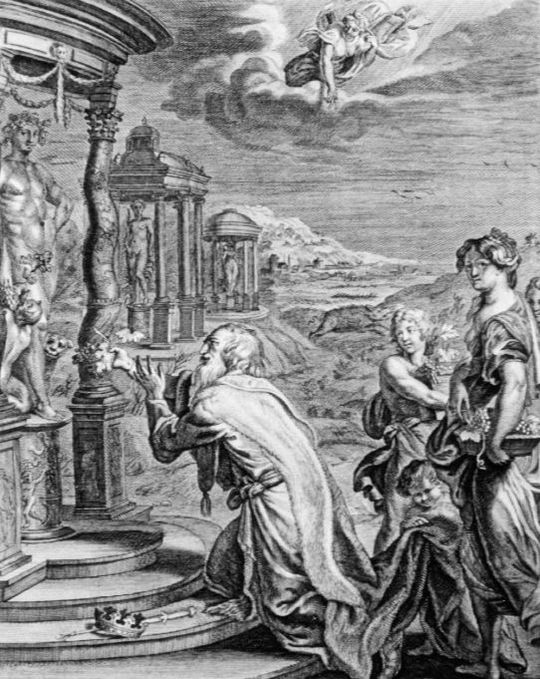Oeneus
In Greek mythology, Oeneus (Ancient Greek: Οἰνεύς, meaning: "intoxicate" or "wine-man" - in the sense of creating wine) was a Calydonian king. He introduced wine-making to Aetolia, which he learned from Dionysus and the first who received a vine-plant from the same god.
Family
Oeneus was the son of King Porthaon and Euryte, and thus, brother of Agrius, Alcathous, Melas, Leucopeus, and Sterope. He married Althaea and became the father of Deianeira, Meleager, Toxeus, Clymenus, Periphas, Agelaus (or Ageleus), Thyreus (or Phereus or Pheres), Gorge, Eurymede, Melanippe and Perimede (although Meleager's and Deianeira's fathers could also have been Ares and Dionysus respectively).
Oeneus was also the father of Tydeus and possibly Melanippus or Olenias by Periboea, daughter of Hipponous, though Tydeus was exiled from Aetolia and appears in myths concerning Argos. According to Pausanias, Mothone was a daughter of Oeneus by a concubine.
In some accounts, Polyxo was called the sister of Meleager and thus, can be counted among the daughters of Oeneus.
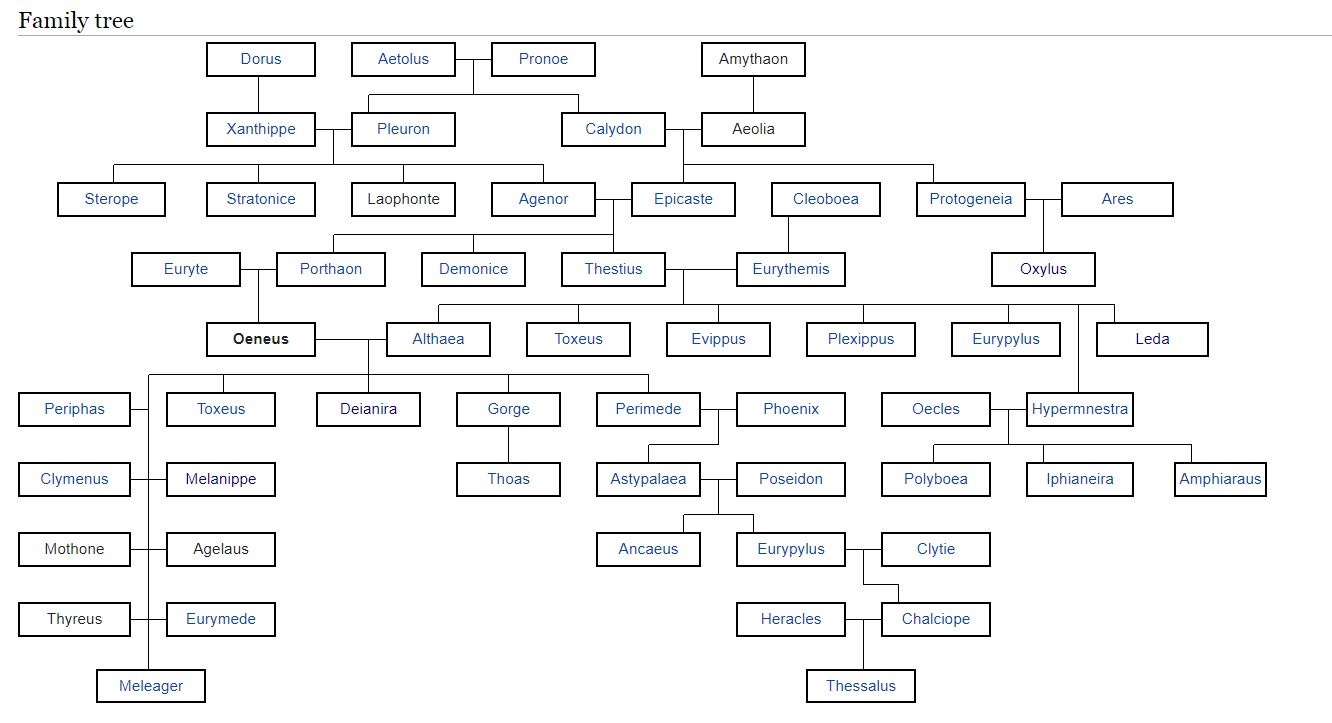
Divine visit
When Dionysus had come as a guest to Oineus he fell in love with Althaea and the king realizing this, he voluntarily left the city and pretended to be performing sacred rites. But Dionysus lay with Althaea, who became mother of Dejanira. To Oineus, because of his generous hospitality, he gave the vine as a gift, and showed him how to plant it (as well as the art of wine making), and decreed that its fruit should be called oinos from the name of his host.
Every year afterwards Oeneus would make sacrifices to all the major deities of the Greek pantheon for the gift given to him. One year though, Oeneus overlooked the goddess Artemis when it came to a share of the sacrifices. Artemis would not let such a slight, even an accidental one, go unpunished, and in retribution Artemis sent forth a gigantic boar to ravage the lands of Calydon.
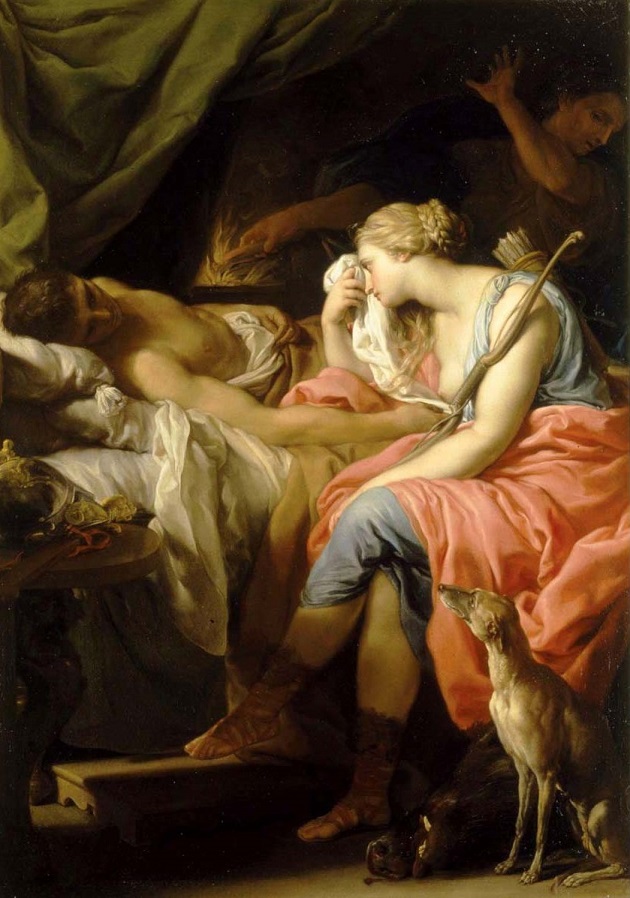
Calydonian hunt
To rid his land of the unwanted pest, King Oeneus sent word out across Greece of his need of help in killing the Calydonian Boar. One herald of King Oeneus would arrive in Iolcus, just after the Argonauts had returned from their epic quest for the Golden Fleece.
Many of the Argonauts who were still in Iolcus decided to travel onwards to Calydon, and of course as Meleager was the son of Oeneus, and an Argonaut, he led the band of heroes home. Other heroes also joined the group, one of whom was the female hero Atalanta, for Atalanta had been present in Iolcus competing in the funeral games of Pelias when Oeneus’ herald arrived.
Once in the kingdom of Oeneus, Meleager would lead the Calydonian Hunters on their hunt, and of course eventually the beast was slain.
It was commonly said that Atalanta inflicted the first wound on the boar, after which, Meleager delivered the killing blow. A dispute arose between Meleager and his uncles though, when the hero attempted to give the skin and tusk of the Calydon Boar to Atalanta as a reward.
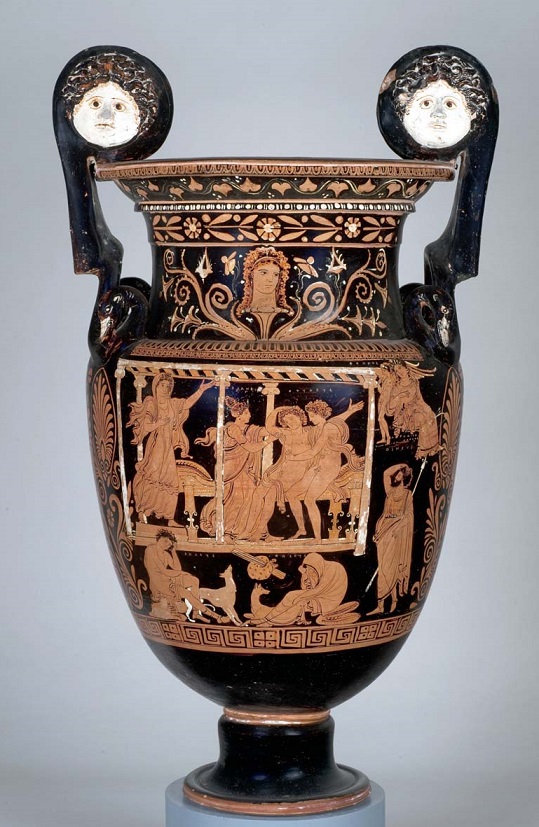
War and Demise
Now some tell of Meleager killing his uncles, which then saw his own mother Althaea bringing about Meleager’s death, the wife of Oeneus then committing suicide afterwards; whilst others tell of war erupting between Calydon and Pleuron, a war which saw Thestius and his sons, as well as Meleager dying in battle.
In either case, the demise of the royal family of Pleuron would see Calydon and Pleuron joined once again, just as they had been in the time of Oeneues’ father, with Oeneus now ruler of both.
After the death of Althaea, Oeneus would remarry, becoming husband to Periboea, the daughter of Hipponous, who was also called Melanippe.
It was widely said that another son would be born to Oeneus by Periboa, a son called Tydeus; though others suggest by the will of the gods, Tydeus was actually born to Gorge, for Oeneus had been made to fall in love with his daughter.
Tydeus would be forced into exile though, for the murder of a relative, or relatives. Some say that Tydeus killed his uncle Alcathous, or his uncle Melas and his many sons, or else Tydeus killed a brother named Olenias. The normal reason given for the killing was due to the fact that Tydeus discovered a plot to overthrow Oeneus.
In any case it was normally said to be Agrius, another uncle of Tydeus who sent the youth into exile, rather than his own father Oeneus.
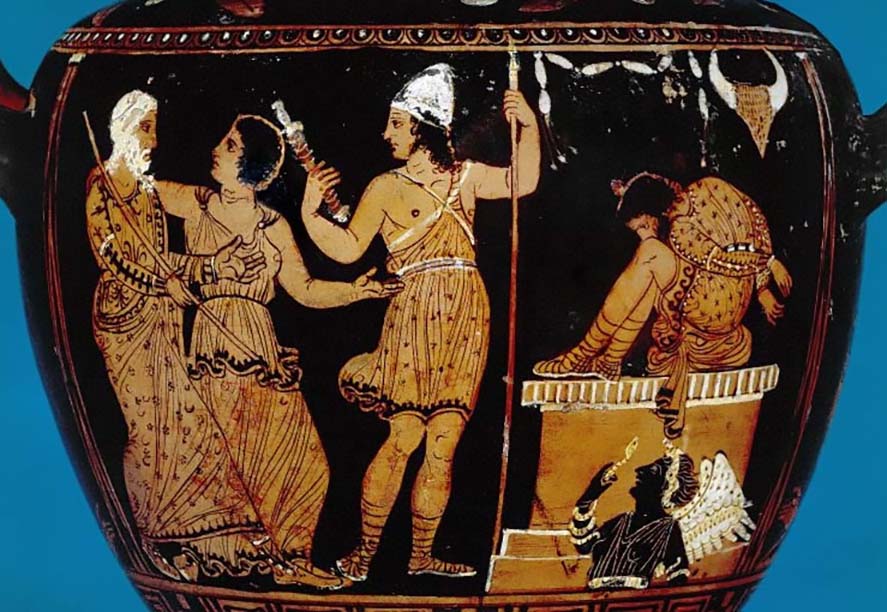
Game of Thrones
The last direct male heir to Oeneus, Tydeus, would die during the war of the Seven against Thebes, although Tydeus had fathered a son, Diomedes, by this time.
The lack of sons made Oeneus vulnerable and the sons of Agrius (Thersites, Celeutor, Lycopeus, Melanippus, Onchestus, and Prothous) decided to overthrow their uncle, and place their own father upon the throne of Calydon.
Not content with sending Oeneus into exile, as occurred in most similar events, the sons of Agrius instead threw their uncle into prison, where it was then said that the former king was tortured by his nephews.
News eventually reached Diomedes of the treatment of his grandfather, although whether this was before or after the Trojan War, depends on the recorder of events.
Diomedes would come to Calydon in the company of Alcaemon, a man who had once been made welcome in Calydon by Oeneus.
Some tell of Agrius committing suicide after he was deposed by Diomedes, and some tell of Diomedes slaughtering Agrius and some of his sons; Diomedes was after all regarded as one of the greatest warriors of the day, and therefore Agrius and his sons were no match for the grandson of Oeneus.
It was decided that Oeneus was now too old and infirm to become king once again, and so Diomedes presented the throne of Calydon to Adraemon, the husband of Gorge.
Diomedes thereafter decided to take Oeneus to Argos with him, but Oeneus would never make it, for the surviving sons of Agrius (Thersites and Onchestus) lay in wait, and whilst travelling through Arcadia, Oeneus was killed. The killers of Oeneus were themselves quickly dispatched by Diomedes.
Diomedes would take the body of his grandfather to Argos, which was then laid to rest in a city subsequently named Oenoe, after Oeneus.
Alternatively, there were no sons of Agrius left alive to kill Oeneus, and as a result the former king of Calydon would live out his life in Argos, dying of old age.
During the Trojan War it was Thoas, the grandson of Oeneus by Gorge, who led forty ships to Troy, making it more probable that the actions of Diomedes occurred prior to the Trojan War.
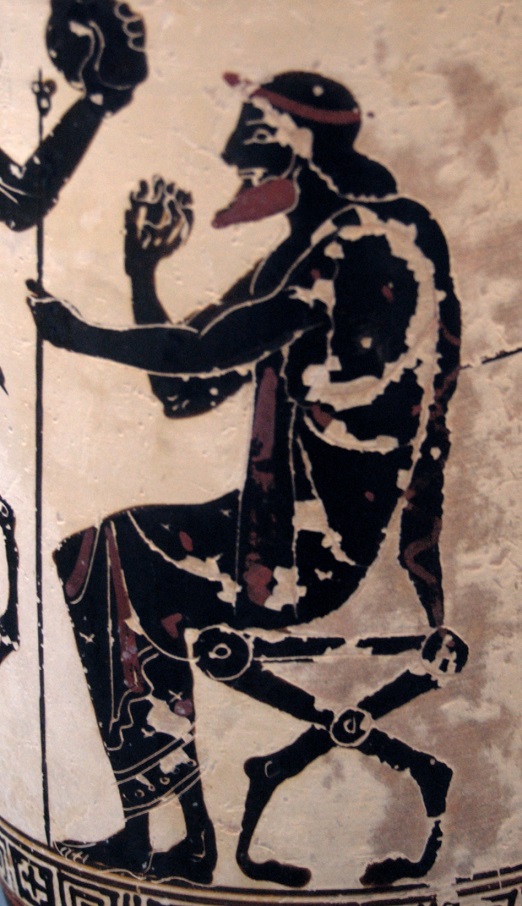
Sources
Pseudo-Apollodorus, Bibliotheca 1.8.1
Pausanias, Graeciae Descriptio 7.4.1
Hyginus, Fabulae 129
The Hesiodic Catalogue of Women gives Meleagrus' father as Ares and names Oeneus' children by Althaea as: Pheres, Agelaus, Toxeus, Clymenus, Gorge and Deianeira (Cat, fr, 25).
Antoninus Liberalis, Metamorphoses 2
Hyginus, Fabulae 69
Pausanias, Graeciae Descriptio 4.35.1
Scholia on Homer, Iliad, 9. 584
Hyginus, Fabulae 172
Dionysius of Halicarnassus, Antiquitates Romanae 4.34.2-3
Pausanias, Graeciae Descriptio 2.25.2
Hyginus, Fabulae 175
Dionysius of Halicarnassus, Antiquitates Romanae 4.35.1-2
"Wikipedia"


